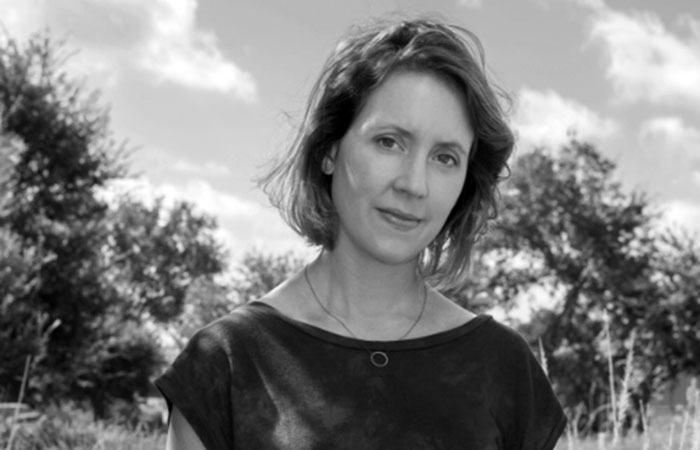In Pursuit of Pursuit: An Interview with Karen Olsson

In this interview conducted by Emily Ellison, author Karen Olsson discusses the processes by which her most recent book, The Weil Conjectures, came to fruition. Although mathematics no longer serves a role in her life, Olsson explains how those studies shaped her current perspective as a writer of fiction and spurred the creation of her memoir. Desire—the allure of an idea—lies at the heart of both mathematics and creative writing, and Olsson reveals how these two endeavors enable us to create elaborate worlds and improve our tools of language.
Karen Olsson is the author of three books: Waterloo, All the Houses, and The Weil Conjectures. She is a former editor of The Texas Observer and currently lives with her family in Austin.

Emily Ellison: I’d like to begin with Simone Weil’s “idea of strenuous faith, a discipline of attention,” which is related to your proposition that “the quality of a life derives from the quality of its searching.” For you, what does this discipline look like as a practice, and what do you find it provides?
Karen Olsson: Well, I think it’s an ideal, certainly—but really I feel so far from the ideal. When you’re writing, you hope to get to that place, but you only get there in brief moments. It’s something I feel is one of the most fulfilling things, but also one of the hardest—when you can enter a state where you’re not so self-aware, and you’re able to focus just on what’s around you. I think it’s something that’s getting harder and harder to do, for everyone.
Ellison: You write about the aspect of desire in the pursuit of knowledge, how we often want to be searching rather than capturing. Whenever you don’t want to search in a direction anymore—perhaps a project’s been completed, or a thread hasn’t retained its dazzle—what is your process in finding something else to follow? What do you do when the spinning top—the idea being chased—stops spinning?
Olsson: I think with novel writing or narrative book writing in general, you have to have a journeyman approach. You cannot expect to be inspired through three hundred pages of prose. My attitude is just to go to work in the morning, clock in, and sit down there, because often it’s when you’re not inspired and you make yourself sit there that something happens you didn’t think was going to happen. So that is what I try to do. I mean, this book is an example of what happened with something I was just not feeling inspired by, and then I was like, “Well, this isn’t working. Alright, let’s hang a left. Let’s see what happens if I try this instead.” And that was fun, I enjoyed it.
Ellison: What is your process like in detecting and naming your unknown, your X?
Olsson: Disorganized [laughs]. Yeah, I don’t know. That’s a really good question. It’s hard to. I feel like I go down long rabbit holes trying to figure out what the question even is. I don’t know if I can ever really exactly name it.
Ellison: Is Conjectures related to that?
Olsson: I always knew that I wanted to call this book The Weil Conjectures, not only because it’s a landmark piece of mathematics but also because I felt like I was conjecturing in some way; I was putting these propositions out there, not sure how true or warranted they were. The name resonated with me for that reason, for referring both to my imagining [the siblings] and conjecturing what this story means to me.
Ellison: While detailing the Weil siblings’ factual accounts, the narrative sometimes shifts into speculation: perhaps this is what they were doing. I found that these moments of fabrication contributed a certain humanness to otherwise austere characters. Was that a difficult move to give yourself permission for—to include the imagining?
Olsson: Not exactly. I had been trying to write a novel about mathematicians, and André Weil was one of the people in the novel. The novel wasn’t working, and I knew he specifically didn’t belong in there, so I started following the thread that was his part in the novel. And so the memoir really began with fictional scenes about them—for the most part different scenes than the ones in the book, though a few are similar. But yeah, the whole book actually arose out of a piece of fiction that wasn’t working.
Ellison: Being interested in both mathematics and creative writing, much of your book discusses the overlap of these two fields and their processes. I was immediately intrigued—perhaps words, too, have magnitude? A set of rational/irrational words or ideas? I’m curious whether you have thought about language through a mathematical lens, and, if so, what might this conflation afford us?
Olsson: Well, I think some people refer to mathematics as a language—kind of like “you have to learn this language in order to do mathematics”—but it’s one of those things that’s true and isn’t true. There is a sense in which mathematical tools are the vocabulary of trying to build things in mathematics. Ultimately, I think I’ve been able see to math and writing as ways of building these alternate worlds that reflect back on our own worlds.
So, I think of it in those terms, but I haven’t thought as specifically about the language of math and the language of writing. I do think that having studied math afforded [me] a kind of bullshit eliminator—or, if not an eliminator, at least it taught me not to get carried away in the words. Words can lead you to a lot of statements that sound nice, but when you actually reflect on them they’re not…
Ellison: Holding up to proofs?
Olsson: Yeah. Because math is so rigorous, it helped me be more rigorous in the way I use language.
Ellison: I believe it was Simone Weil who suggested geometry might be a key to nature, a way to understand our world better—do you find that your mathematical background has helped you understand your life in such a way?
Olsson: I don’t know about my life. I do think of it more as a tool for clear thinking, for not being fanciful in the way I approach things. I think studying math or any of the sciences helps you feel empowered as somebody who can learn things. There are plenty of things that are difficult and that I will never learn, but I have the feeling that if it really counted and I really needed to learn it, I could probably learn it. So, that’s been my approach. Especially when I was working more as a journalist, there were certain subjects about which I felt, “I can write about this, it’s learnable.” So, I guess math helped me feel like the world was learnable.
Ellison: While discussing fixed-point theorems, you propose “the idea that not everything changes at once, that in the middle of no matter what catastrophe there’s something that stays still”—has this influenced how you process change and transition?
Olsson: I wouldn’t say I’m directly influenced by fixed-point theorem; it’s more that this theorem is a rare one that I find suggestive, and which already resonates with a way I see the world: as something that does not remain fixed. For me, most things that are math are just math; they don’t have an aura around them I attribute some meaning to. I left math behind after college, and I wasn’t doing math problems on the side. I came back to it for this book, to try to understand why it compelled me so much. I think it left me with those scales we talked about before, but it wasn’t part of my life until a few years ago when I started revisiting it. But I don’t know—there’s just something a little bit magical in that theorem.
Ellison: The mathematical fugue state you write of, a “state of lucid exaltation in which one thought succeeds another as if miraculously, and in which the unconscious seems to play a role,” sounds akin to the inspiration that writers speak of—a deliverance, a sudden illumination. Regarding your writing, do you find yourself experiencing such spells?
Olsson: I myself have never gone into a fugue state of inspired writing. We’re going to be in Italy this summer, and one of the things we’re going be near is [Rilke’s] Duino Castle, and I was like, “I want to go there, I just want to stand and feel what happened?!” Because I’ve wished for that. I have never had a Duino Castle of my own.
Ellison: Concerning the communion and collaboration you notice among students of math, do you see that mirrored in your writing life and communities?
Olsson: It’s just different. There’s not an analog, because mathematicians and math students can team up to solve a problem. You can co-write a newspaper article, but writing is so individual and subjective that I don’t think you can really collaborate on a novel or poem in the same way, or not often. It’s not in the same way a collaborative endeavor; it’s more in the social sense. It’s important to have your community of writers to commiserate with, to text each other about how much you hate writing, stuff like that.
I think that’s a thing a lot of people don’t realize about math, because we do have that archetype of the lone genius. And yes, there are people figuring stuff out on their own, but there’s a lot of feedback. And certainly in writing, too, there’s a lot of mutual influence with the trends and styles that come along. So in that way, we’re all kind of in it together, trying to solve the problem of what it means to be here.


